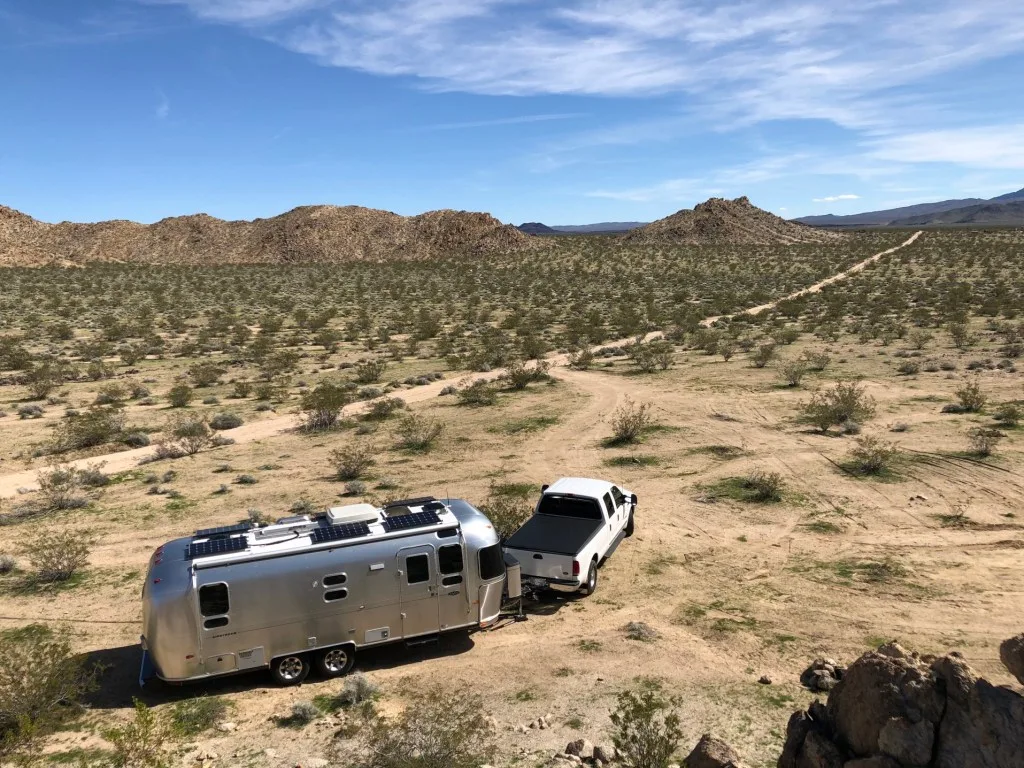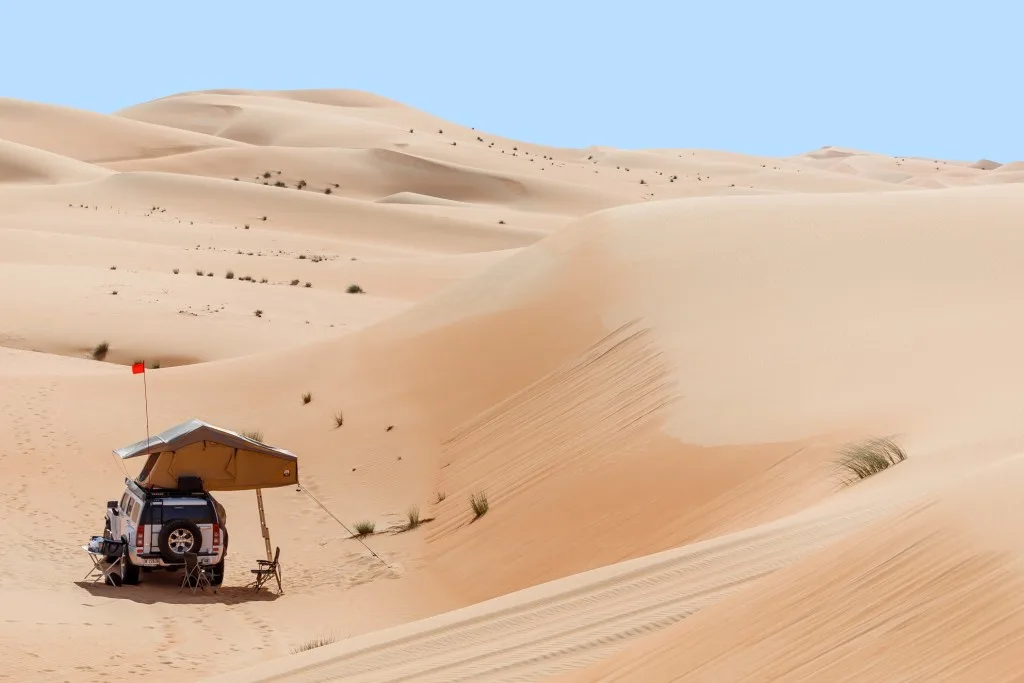Whether in the mountains, the desert, or a thick national forest, boondocking can be a unique way to camp. Some of the best spots provide tremendous amounts of privacy and space.
However, the fact that sites can also be incredibly remote may have you asking, “How safe is it to leave my RV when boondocking?”
If that’s you, keep reading to find out!
What Is Boondocking?
Boondocking, also known as dry or wild camping, is a camping style where campers use public-use lands to camp. Aside from the site itself, these sites typically provide little to no amenities. Those who enjoy this camping style are generally self-reliant and use RVs, conversion vans, and overlanding vehicles.
Self-reliant boondockers often use generators or solar power to keep their rig’s battery bank charged. With the right setup, you can enjoy boondocking full-time all over the country.
Can You Boondock Anywhere?
While there are thousands of spots to boondock across the country, you can’t boondock anywhere you want. Public-use lands are popular options for boondocking because tax money pays for them to be managed and maintained. So as long as the governing agencies haven’t restricted camping or access to the lands, you can often boondock.
It’s important to note that there are some restrictions on where you can boondock, even on public-use lands. In many places, regulations limit camping to only designated campsites. So you can’t just park your rig anywhere and camp.
Pro Tip: Make boondocking easy with these 22 RV Boondocking Tips for 2022.

Is Wild Camping Even legal?
There is nothing illegal regarding boondocking. However, you can break the law while boondocking. You’ll be on the right side of the law as long as you observe all of the rules and regulations necessary to boondock.
It might sound confusing, but it’s like driving. There’s nothing illegal about the act of driving, but there are rules and regulations required of drivers. You must have a valid driver’s license, you have to obey standard traffic regulations, and you should drive safely. Boondocking is the same way in the sense that you can boondock and still stay on the right side of the law.
How Safe Is It To Leave Your RV When Boondocking?
When you’re new to boondocking with your RV, it can be uncomfortable to leave your RV. At first, you may spend the entire time worrying you’ll discover the worst possible scenario when you return to your boondocking site. You likely imagine someone stole your RV or raided it and all of your belongings.
It’s normal to worry about this type of stuff. Your RV is a major investment, and likely contains a significant amount of your possessions. However, the reality is that very few RVers experience any issues when they leave their RV while boondocking.
Do thefts happen? Yes. Are you likely to experience one? Probably not.
We hear and see more reports of RVs getting stolen out of driveways and storage lots than we do from those boondocking. Now should you leave all of your valuables laying out and unsecured? Absolutely not.
If you’re not planning to be at your site, put away anything of value and make sure to lock all of your storage compartments and any doors and windows to your RV. A bit of common sense will go a long way to keeping your RV and possessions safe while you’re boondocking.
And, always trust your gut!

Is Dry Camping on BLM Land Safe?
Typically, boondocking on BLM land is no less safe than camping in a standard campground. In our experience, most of the people you’ll see and interact with while boondocking on BLM land will be other boondockers.
Depending on where you’re boondocking, you may run into others who are using the BLM land for recreation like hiking, off-roading, or other perfectly legal activities. Do people use the land for illegal activities and partying? Yes, it does happen from time to time, but we more often saw the aftermath of a party than the actual party itself.
You should keep your safety in mind no matter where you are camping. How you choose to protect your family is a very personal decision. However, it’s not just seedy people that can cause you problems. Depending on where you’re boondocking, you need to make sure you’re keeping your campsite clean to avoid attracting bears and other large animals that can be equally as dangerous as humans.
Pro Tip: While boondocking make sure you don’t do any of these 7 Deadly Sins of Boondocking.
How Long Can You Dry Camp in an RV?
Depending on how long you can stay, restrictions will vary depending on the governing agency. The most common lengths you’ll see are 10 to 14 days.
However, we have seen some areas shorten the restrictions to five days during peak seasons where sites are in high demand. You’ll want to check with the governing agency to make sure you’re aware of the stay limit restrictions.

What Do I Need For Boondocking?
If you plan to spend your time regularly boondocking, you’ll want to have a handful of items to maximize your experience. Keep in mind you’ll need to create your power. There won’t be a power pedestal to plug your RV into at the campsite. For most boondockers, this means having a portable generator or solar power system to keep their battery bank or other accessories running.
The other two important things you’ll need to consider are handling water and waste. You’ll want to keep your tanks full and be able to dispose of waste without having to pack up camp.
Many boondockers use water bladders that can make it easy to add 50+ gallons to your freshwater tank. A towable waste tank can also help you transport your wastewater to the nearest dump station without having to pack up your campsite and risk losing your awesome site.
Is Boondocking Worth It?
Boondocking is one of our favorite ways to camp. As RVing is becoming increasingly more popular, campgrounds are incredibly crowded. If you take a few common-sense safety measures, it can be relatively easy to stay safe while boondocking. If you arrive at a campsite and don’t feel safe, keep moving until you do. Boondocking provides the freedom to find a campsite that checks all of your boxes, including safety.
What safety tips would you share with anyone interested in boondocking? Tell us in the comments!
Discover the Best Free Camping Across the USA
To be honest with you, we hate paying for camping. There are so many free campsites in America (with complete privacy).
You should give it a try!
As a matter of fact, these free campsites are yours. Every time you pay federal taxes, you’re contributing to these lands.
Become a FREE CAMPING INSIDER and join the 100,000 campers that love to score the best site!
We’ll send you the 50 Best Free Campsites in the USA (one per state). Access the list by submitting your email below: